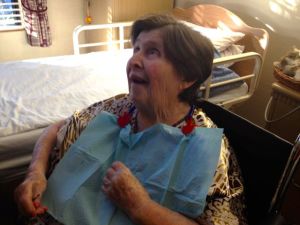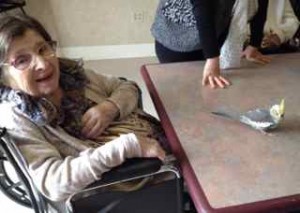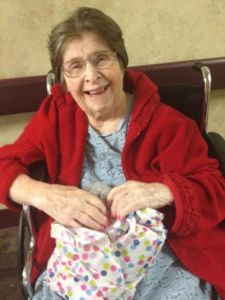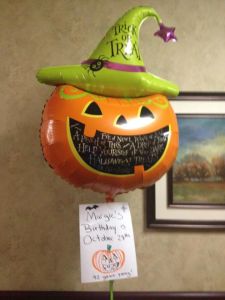Tips 2 Seniors | The Blog
with Author: Diane Masson
10 Dementia Gift Ideas
When I brought my mom a Christmas gift from my brother and sister-in-law, she had no recognition on her face as she read the tag. My mom’s vascular dementia is stopping her from connecting her son’s written name with his face. That part of her brain is gone. So what do you do?
Does your mom or dad have dementia? Are they still at home or residing in an assisted living, memory care or skilled nursing community? My mom has had dementia for 12 years and has lived in skilled nursing care for 19 months. She cannot remember anything and only speaks clearly about 30 to 50 percent of the time.
My recommendation is to give a photo of yourself with your gift. Attach your photo directly to the gift. Your parent has a better chance of recognizing you in the photo than knowing who you are by reading a gift tag.
Here are 10 dementia gift ideas:
- A soft lap blanket – I gave my mom a small Christmas blanket and it was a homerun. Every time she sees it, she touches it and comments on the softness. My intention was giving a functional gift (keeping her warm) and an easy way for her to recognize the holiday season. It has really worked, because last night she talked about Christmas on her own.
- A manicure or hand massage – Hopefully this can be performed by you? It is a way to connect physically, so they can feel your presence and love. My mom loves having her nails done.
- A sweater – A nice red sweater or sweatshirt is always a hit. They like to feel the texture of different clothes. It keeps them warm. Their caregiver will dress them in the sweater and then keep reminding them that it is Christmas time. The red color seems to help the mood of the caregiver, which is always a bonus.
- Soft socks – If your mom or dad has swollen ankles, normal socks can feel binding. I get those soft stretchy socks you find in airports. They used to be easy for her to put on herself. Now she needs a caregiver to dress her.
- A holiday balloon – My mom used to read the paper daily to know the day and the year. Now, I put up seasonal balloons in her room, so she can know it is her birthday, Thanksgiving, Christmas, etc.
- A small fake tree with ornaments – If your parent still lives at home, maybe you can decorate for them? If they live in assisted living, memory care or skilled nursing care a tree always feels like home. Many communities cannot legally allow a real tree because of licensing, so be sure to ask.
- A ham – If your parent still lives at home, this is an awesome gift. They can heat the ham or eat it cold. They can make numerous meals out of it including sandwiches or with scrambled eggs. Yum!
- Bring lunch to them or go out to eat – Everyone gets sick of their own cooking or the community’s cooking. Something different and special is always a hit. The best part is spending time dining with you.
- An animated animal – If your parent still lives at home with a pet, then bring a gift for Fido or Fluffy. But if your parent lives in an assisted living, skilled nursing or memory care community a fake moving pet is outstanding. My mom has several fake cats and they completely enamor her, make her smile and laugh out loud. Pets are wonderful.
- The very best gift you can give is an hour of your time. Nothing is more important than spending a little quality time together.
Gift giving needs to be adjusted to the level of care and to the severity of your parent’s dementia. Good luck and share your other gift tips in the comment section.
Diane Masson’s new guide book for seniors, “Your Senior Housing Options,” will be will be coming soon to Amazon.com. If you sign up for my weekly newsletter on the right side of this blog, you will be notified when my new book becomes available. Check out my new website: Tips2Seniors.com or please follow me on Facebook.
“Your Senior Housing Options,” is dedicated to my mother, whose stories are peppered throughout. Being her advocate for over ten years has taught me to be a better person. My mom has dementia, but I am truly blessed that she still calls me by name. Her smile and joy inspires me to see the positive side of life. It makes me want to reach out and help seniors and their families make better choices today so they can have more secure long-term care plans tomorrow.
Dentistry and Dementia
 Am I a bad daughter? Yesterday, I learned the shocking truth that my mom has five missing teeth. My mom has lived in a higher level of care for over eight years. Seven years in assisted living in Seattle and the last 17 months in skilled nursing care in California.
Am I a bad daughter? Yesterday, I learned the shocking truth that my mom has five missing teeth. My mom has lived in a higher level of care for over eight years. Seven years in assisted living in Seattle and the last 17 months in skilled nursing care in California.
My mother has had vascular dementia for over 10 years and I have been attending doctor appointments with her for years. Why did I never consider oral health and attending a dentist appointment?
It was pure luck that I visited my mom this week when the mobile dentist was there. Dr. Mark Mroch was awesome. He had a funny and engaging personality. My mom was completely enamored with him. They were joking back and I forth and I was cracking up.
According to dental records the five teeth were missing when my mom arrived in California. Now that I have processed this situation, I have some unanswered dental questions:
- Why did no one tell the POA (Power of Attorney) of a dementia patient that her mom had five teeth missing when it was first discovered?
- Has my mom with her dementia been responsible for her own dental hygiene for all these years?
- Do assisted living and skilled nursing communities brush and floss teeth?
- How often?
- If the senior tells the caregiver that flossing hurts, do they just discontinue flossing and not tell the family?
- Is a dentist required to request flossing in order for it to happen?
Can you please share what the oral hygiene policy is at your assisted living, skilled nursing or memory care community? I know the goal is to have the residents be as independent as possible and brush his or her own teeth. What if they are not doing a good job? When does staff step in to help? Do staff actually watch them brush their teeth or is this one of those back burner items that can get overlooked?
My mom lived in a social model of assisted living. She was borderline skilled nursing for a year or so before we moved her. Is the dental program for dementia different in a social vs. medical model of assisted living?
Please help me figure this out and maybe we can help some POA’s out there who never thought about oral hygiene before. It’s vital that we advocate for our loved one.
Thanks, Diane
Diane Twohy Masson writes this weekly blog to support and engage with other senior housing professionals. Her first book is Senior Housing Marketing – How To Increase Your Occupancy and Stay Full. Many sales teams and organizations have used the 12 keys contained in this book for their weekly book review.
Diane Masson has recently created a New Guide for the Silver Tsunami. Her second book offers a pro-active approach for a senior to navigate his or her way through the senior housing market. “Selecting Senior Housing Options for Seniors IN the Silver Tsunami” is coming soon to Amazon.com. www.tips2seniors.com
© Marketing 2 Seniors| Diane Twohy Masson 2014 All Rights Reserved. No part of this blog post may be reproduced, copied, modified or adapted, without the prior written consent of the author, unless otherwise indicated for stand-alone materials. You may share this website and or it’s content by any of the following means: 1. Using any of the share icons at the bottom of each page. 2. Providing a back-link or the URL of the content you wish to disseminate. 3. You may quote extracts from the website with attribution to Diane Masson CASP and link https://www.marketing2seniors.net For any other mode of sharing, please contact the author Diane Masson.
Dementia Birthday Tip
My mom is going to be 92 years young on Tuesday and she has had vascular dementia for around 11 years. She can’t remember what she had for breakfast, but she still knows my name. Last week when my husband and I went to see her at the Freedom Village Health Care Center she said, “What a surprise, I am happy to see you!” I was so astonished with her welcome. Usually it can take several minutes for her brain to adjust that we are there. We celebrated her birthday month that evening with a snack, gift and watching a movie together. She was 70% cognitively with us and shared some childhood memories.
This week, I was not so lucky. I arrived in the morning with a balloon and a gift from my brother. When I saw her, she was in an anxious mood. I braced myself for an unknown emotional roller coaster. The balloon scared her at first, which shocked me. Then she wanted to read it and soon she was laughing. She told me that it was not a good day, that she could not remember anything and it was all so confusing. I told her that I understood and that it would be okay. She calmed down and then asked what was in the package. I told her it was her birthday gift from my brother Paul. “Is it my birthday?” she asked. I laughed and showed her the sign that I had attached to the balloon. It said, Margie’s birthday is October 28th, she will be 92 years young.
I set the balloon next to her and everyone who walked by wished her a happy birthday. It was awesome. My first thought was that every care ambassador and nurse would read the sign and wish her a happy birthday 24-7 for a few days. My second thought was that my mom could read the sign and know that it was her birthday week. I helped her open the gift of a new sweater. She loved the texture, because it was so soft. The card enamored her most and she kept looking at it and opening and closing it. With all the pictures on it, I realized that it was so busy that she could not focus on what my brother and sister-in-law had written inside. So I read it to her several times. She loved it.
When I saw her on my next visit, she was agitated with red spots on her checks. She was relieved to see my familiar face. After several minutes of my speaking soothing comments, she came back to me mentally. Then she asked if I had any food. I always bring food, because food can have a calming effect on her. I produced a banana from my purse and her eyes lit up. “For me?” she said. I laughed and said, “Yes!” I opened it and she said that she wanted to hold it. Sometimes she wants me to hold it and she breaks off part of the banana. I have learned to go with flow and to accept the not good days or moments that adjoin laughter and happier days.
Happy birthday month Mother!
Diane’s number one tip for those who have a loved one with dementia is to expect the unexpected. You may want to celebrate their birthday on the actual day, but that may not be a good day for your loved one with dementia. Be flexible and have a willingness to celebrate their special day on another day or just have a birthday month celebration for them and you are sure to hit one good day. Stay calm and be soothing to your loved one. Don’t ask someone with dementia a lot of questions, they can’t process them. Just let them talk to you about what is on their mind. They might want to talk about their childhood or the depression. Adapt to them and go with the flow.
Diane Masson’s new guide book for seniors, “Selecting Senior Housing for Seniors in the Silver Tsunami,” will be will be coming soon to Amazon.com. If you sign up for my weekly newsletter on the right side of this blog, you will be notified when my new book becomes available. Check out my new website: Tips2Seniors.com or please follow me on Facebook.
Hiring a Caregiver “Under the Table”
 Potentially a senior can save significant money by hiring a companion recommended from church or their neighbor’s friend who has been out of work. It’s a win/win for everybody – right? Wrong! What is their recourse if this win/win situation starts going badly? There is no boss or company where they can voice concerns.
Potentially a senior can save significant money by hiring a companion recommended from church or their neighbor’s friend who has been out of work. It’s a win/win for everybody – right? Wrong! What is their recourse if this win/win situation starts going badly? There is no boss or company where they can voice concerns.
Last week, I attended the Care Revolution Conference in Anaheim, CA and met over 20 home care company owners and managers. One manager shared that the majority of her potential caregiver applicants do not pass the drug screening. I was shocked. Another home care owner shared that 40% of the remaining applicants don’t pass the criminal background check. Reputable agencies have a vetting process so a senior can have confidence about who is in their home providing care.
Home care owners shared with me that seniors who hire a caregiver “under the table,” become employers and are responsible for taxes and social security of their employee. Seniors should check with their accountant and consider the ramifications of paying quarterly taxes for an employee. Initially, it may sound like a bargain to pay a caregiver “under the table.” Seniors need to consider the long-term financial consequences and legalities. It seems crazy to me that a senior needing help would become an employer and have to pay quarterly taxes.
If a caregiver claims a work injury while working for a senior, costs can climb upwards to $300,000 after surgery, therapies and loss time from work. Some caregivers work for multiple companies, so one never really knows if the injury was from working for the senior or another employer.
Here’s a shout out to those reputable home care companies who provide great care to seniors! I had no idea how hard it was for you to find and hire quality caregivers.
This is an excerpt from my new guide book for seniors, “Selecting Senior Housing for Seniors in the Silver Tsunami.” It will be coming soon to Amazon.com. If you sign up for my weekly newsletter on the right side of this blog, you will be notified when my new book becomes available. Check out my new website: Tips2Seniors.com or please follow me on Facebook
Photo credit to Moretimeforyou.com
Diane Twohy Masson writes this weekly blog to support and engage with other senior housing professionals. Her first book is Senior Housing Marketing – How To Increase Your Occupancy and Stay Full. Many sales teams and organizations have used the 12 keys contained in this book for their weekly book review.
© Marketing 2 Seniors| Diane Twohy Masson 2014 All Rights Reserved. No part of this blog post may be reproduced, copied, modified or adapted, without the prior written consent of the author, unless otherwise indicated for stand-alone materials. You may share this website and or it’s content by any of the following means: 1. Using any of the share icons at the bottom of each page. 2. Providing a back-link or the URL of the content you wish to disseminate. 3. You may quote extracts from the website with attribution to Diane Masson CASP and link https://www.marketing2seniors.net For any other mode of sharing, please contact the author Diane Masson.
Sugar Addict Seniors?
 Does every assisted living and skilled nursing community in America serve a dessert to their residents for lunch AND dinner? Is this too much sugar? Can sugar cause or increase dementia and Alzheimer’s?
Does every assisted living and skilled nursing community in America serve a dessert to their residents for lunch AND dinner? Is this too much sugar? Can sugar cause or increase dementia and Alzheimer’s?
My mom lived in assisted living for 7 years and had desserts twice a day. Now, she has lived in skilled nursing for 17 months with desserts twice a day and don’t forget the occasionally ice cream snack or the birthday party with cake. She has progressed over nine years from some memory loss to full blown vascular dementia. Was it life, genes or could sugar have helped it along? What is your opinion?
Fact: It is very hard for me to walk away from a good piece of chocolate. I am a sugar addict. Then I started reading about sugar causing inflammation in the body according Dr.Daniel Amen and how sugar can lead to dementia according to New York Times’ best selling author David Perlmutter, MD. When I started eating more that 12 pieces a day, I decided to give up sugar.
Every month, I am a presenter at four or more marketing luncheons for prospective residents. The lunches are outstanding and always end with a spectacular dessert. This week it was a cheesecake with strawberry sauce. I said no thank you. As the excellent servers are glancing around and notice that I don’t have a dessert, they come over to offer me one again. Sometimes I have had to say no to dessert three times at one luncheon. It is tough to give up sugar!
Temptation is everywhere! There is always a birthday celebration with cake, candy in the office, bakeries and here comes Halloween candy. Do you nibble or eat as much as possible? Do think it will cause us to have dementia sooner?
How many of us working folks eat two desserts every day? Is it bad that we feed two desserts to our seniors with dementia twice a day in our assisted living and skilled nursing care communities?
Diane Twohy Masson writes this weekly blog to support and engage with other senior housing professionals. Her first book is Senior Housing Marketing – How To Increase Your Occupancy and Stay Full. Many sales teams and organizations have used the 12 keys contained in this book for their weekly book review.
Diane Masson has recently created a New Guide for the Silver Tsunami. Her latest book offers a pro-active approach for a senior to navigate his or her way through the senior housing market. “Selecting Senior Housing Options for Seniors IN the Silver Tsunami” is coming soon to Amazon.com. www.tips2seniors.com
© Marketing 2 Seniors| Diane Twohy Masson 2014 All Rights Reserved. No part of this blog post may be reproduced, copied, modified or adapted, without the prior written consent of the author, unless otherwise indicated for stand-alone materials. You may share this website and or it’s content by any of the following means: 1. Using any of the share icons at the bottom of each page. 2. Providing a back-link or the URL of the content you wish to disseminate. 3. You may quote extracts from the website with attribution to Diane Masson CASP and link https://www.marketing2seniors.net For any other mode of sharing, please contact the author Diane Masson.
“Is there a Hippie Retirement Community?”

Hippie Retirement Communities?
A younger senior woman with long hair and beads asked me this question at a presentation last week. I asked what a hippie retirement community would look like for her. She said, “Less walls and more indoor and outdoor living. Where you felt outdoors, even when you were indoors.”
This made me think about our outdoor dining venues, so I showed her the “Fountain Café at The Village.” It is an outdoor dining venue, where the chef barbeques for the residents. Entrée choices might be barbequed salmon, ribs or an amazing burger. Soft music emits from rock speakers that reside in the surrounding garden. Residents can come and sit in the outdoor café at any time to read a book or spend time with visiting family. Beyond the Fountain Café area is the popular putting green.
She loved the outdoor area. I said, “Is this what you are talking about?” She said, “Yes!” Then I explained how the health club with state-of-the-art exercise equipment adjoined the outdoor swimming pool. It has an indoor/outdoor feeling too.
The younger senior loved it and agreed, but said she was not ready for an apartment with walls. Anyone know of a hippie retirement community, maybe something with tents? Are we ready for Boomer hippies?
Can you share what is happening in your city and state, so we can all understand senior housing from a national perspective? It’s as easy as making a comment below. Thanks in advance for joining the conversation and sharing this blog with other professionals in the senior living world.
Diane Twohy Masson is currently writing a new book for seniors on how to select senior housing options. Her first book, “Senior Housing Marketing – How to Increase Your Occupancy and Stay Full,” is available at Amazon.com with a five star rating. Masson continues to set move in records as the regional marketing director of two debt-free Continuing Care Retirement Communities in Southern California – Freedom Village in Lake Forest and The Village in Hemet, California. Her mom’s struggle with dementia is inspiring Diane to pen a third book to support adult children.
© Marketing 2 Seniors| Diane Twohy Masson 2014 All Rights Reserved. No part of this blog post may be reproduced, copied, modified or adapted, without the prior written consent of the author, unless otherwise indicated for stand-alone materials. You may share this website and or it’s content by any of the following means: 1. Using any of the share icons at the bottom of each page. 2. Providing a back-link or the URL of the content you wish to disseminate. 3. You may quote extracts from the website with attribution to Diane Masson CASP and link https://www.marketing2seniors.net For any other mode of sharing, please contact the author Diane Masson.
Can You Miss One Long-term Care Payment?
 Yesterday, I learned of a senior resident in California who was denied HER long-term care coverage in skilled nursing, because she had missed one payment while ill. Are you seriously kidding me? This is flat out wrong and it makes me angry. I have been in the senior living industry for fifteen years and always considered those with long-term insurance fortunate.
Yesterday, I learned of a senior resident in California who was denied HER long-term care coverage in skilled nursing, because she had missed one payment while ill. Are you seriously kidding me? This is flat out wrong and it makes me angry. I have been in the senior living industry for fifteen years and always considered those with long-term insurance fortunate.
Now I realize that when a senior is most vulnerable is also when they need this coverage to kick in. Who will fill out the paperwork? All the Continuing Care Retirement Communities where I work graciously accommodate residents in this area. But what about missing a payment to the long term care insurance company? This seems bound to happen.
According the Alzheimer’s Association one in three seniors die of dementia, so it would make sense that a senior with dementia or Alzheimer’s might miss a bill or two. So all those years of paying in for a higher level of care are negated when you are sick and demented? Come on, this is not acceptable.
Long-term care insurance is a security blanket to offset the high cost of future health care as you age. Many seniors have paid in for years to either have a policy that provides up to a certain dollar amount or certain time range (typically three years).
The senior and her family are all panicked. The son made numerous attempts to call his mom’s insurance company and would remain on hold for over forty minutes. Unbelievably, after he finally reached them thirty days later, the policy had expired two days before for lack of payment. If someone has been paying for long-term care insurance for years, you should not be penalized when you are sick and need the care the most. The family is appealing.
Has anyone else heard of this happening? Is this normal? Do you think it is okay?
Please consider joining this exclusive Marketing2Seniors blog and comment below to join the conversation and interact with other senior living professionals on what is currently being effective to increase occupancy on a nationwide basis.
Diane Twohy Masson is currently writing a new book for seniors on how to select senior housing options. Her first book, “Senior Housing Marketing – How to Increase Your Occupancy and Stay Full,” is available at Amazon.com with a five star rating. Masson continues to set move in records as the regional marketing director of two debt-free Continuing Care Retirement Communities in Southern California – Freedom Village in Lake Forest and The Village in Hemet, California. Her mom’s struggle with dementia is inspiring Diane to pen a third book to support adult children.
© Marketing 2 Seniors| Diane Twohy Masson 2014 All Rights Reserved. No part of this blog post may be reproduced, copied, modified or adapted, without the prior written consent of the author, unless otherwise indicated for stand-alone materials. You may share this website and or it’s content by any of the following means: 1. Using any of the share icons at the bottom of each page. 2. Providing a back-link or the URL of the content you wish to disseminate. 3. You may quote extracts from the website with attribution to Diane Masson CASP and link https://www.marketing2seniors.net For any other mode of sharing, please contact the author Diane Masson.
Guarantee of Care For Life?
 Many senior living communities say, “We will take care of you for the rest of your life.” Really? What if a senior legitimately runs out of his or her resources? Can they still stay for life? Is it a marketing spiel or a real guarantee? What promise is really written in the resident’s contract? Do they offer at least three levels of care including skilled nursing?
Many senior living communities say, “We will take care of you for the rest of your life.” Really? What if a senior legitimately runs out of his or her resources? Can they still stay for life? Is it a marketing spiel or a real guarantee? What promise is really written in the resident’s contract? Do they offer at least three levels of care including skilled nursing?
Senior living communities can talk about a “fund” to help residents or a “Good Samaritan Fund.” My own mom was lucky enough to benefit from this type of fund. I never dreamed in a million years that my mom would live in a higher level of care like assisted living for so many years (seven to be exact). In the middle of those seven years, my mom ran out of her resources. She has social security, an annuity, a pension and a savings account. Her savings account depleted down to $2,000.
Thank goodness my mom’s Continuing Care Retirement Community (CCRC) had a Good Sam Fund that was developed out of generous donations. The little known fact was that only 10 seniors could benefit from the fund at any given time. My mom was number 10. I never knew if there was a resident whose number was 11 or higher that never received financial help.
Now, I know about two CCRC’s in CA that offer a Guarantee of Care for life. It is straight up and clearly written in the contracts at Freedom Village in Lake Forest and The Village in Hemet.
An attorney compared CCRC contracts in Orange County and determined that all were not equal in the guarantee of care for life. Some are straight up and others offer, “A guarantee of care for life,” but add three extra words following this statement in the contract… those three extra words are, “At our option.”
“At our option,” sounds a lot like a Good Sam Fund that has a limited amount of resident users. What do you think?
Please share your successes, failures or comment below to join the conversation and interact with other senior living professionals on what is currently being effective to increase occupancy on a nationwide basis.
Diane Twohy Masson is the author of “Senior Housing Marketing – How to Increase Your Occupancy and Stay Full,” available at Amazon.com with a 5-star rating. The book is required reading at George Mason University as a part of its marketing curriculum. Within this book, the author developed a sales & marketing method with 12 keys to help senior living providers increase their occupancy. Masson developed this expertise as a marketing consultant, sought-after blogger for senior housing and a regional marketing director of continuing care retirement communities in several markets. She has also been a corporate director of sales and a mystery shopper for independent living, assisted living, memory care and skilled care nursing communities in multiple states. Currently, Masson is setting move-in records as the regional marketing director of two debt-free Continuing Care Retirement Communities in Southern California – Freedom Village in Lake Forest and The Village in Hemet, California. Interestingly, this career started when she was looking for a place for her own mom and helped her loved one transition through three levels of care.
© Marketing 2 Seniors| Diane Twohy Masson 2013 All Rights Reserved. No part of this blog post may be reproduced, copied, modified or adapted, without the prior written consent of the author, unless otherwise indicated for stand-alone materials. You may share this website and or it’s content by any of the following means: 1. Using any of the share icons at the bottom of each page. 2. Providing a back-link or the URL of the content you wish to disseminate. 3. You may quote extracts from the website with attribution to Diane Masson CASP and link https://www.marketing2seniors.net For any other mode of sharing, please contact the author Diane Masson.
How To Move Someone Saying, “No!”
 It would be very interesting for independent, assisted living and group homes to share examples of people who moved into your senior living community who initially said, “No, I don’t want to leave my home!” How many senior living residents have you experienced in this situation?
It would be very interesting for independent, assisted living and group homes to share examples of people who moved into your senior living community who initially said, “No, I don’t want to leave my home!” How many senior living residents have you experienced in this situation?
Two weeks ago, I heard the story of an independent couple whose Boomer children moved them one hour closer to them. The dad said that he had left heel marks all the way up the freeway, because he didn’t want to move. Now, both he and his wife love living at their new Continuing Care Retirement Community that is located by their children and grandchildren.
Tonight, I heard about Jim and Joan’s dad. He was clinically depressed and stayed in his pajamas all day. He only put on clothes when Jim picked him up (drove him one block) to spend time with his wife and grandchildren. Once his dad, Dwayne, got to their house and had dinner, he didn’t want to leave, even at 11:00 PM. Jim and his wife Carol both had to be at work at 7:00 AM. They literally had to take a resistant Dwayne back to his home each evening. This went on every night for one year. Jim finally reached the breaking point.
Jim and his sister Joan went to find a retirement community for their dad. They had it all set up and then drove their dad to his new home. The entire way there, Dwayne kept saying, “No, no, no!” They said, “Dad, you will love it, give it a chance.” They showed him his new home and he was still resistant. Jim kept saying, “Dad, give it a chance,” and left. Two weeks later the dad was happier than he had been in his own isolated home. Dwayne spent five of the happiest years of his life there. Medication management and socialization had improved the quality of his life.
Nine years ago, my own mom was struggling (for over a year) in the independent living area of a Continuing Care Retirement Community. My sister, husband and I moved all my mom’s stuff to assisted living while her granddaughter took her to lunch. My daughter drove my mom back to her new home in assisted living. We were all there to greet them. My mom was shocked, but what could she do? We had moved her. It was done. The staff was all on board and had acclimated her before we left. Oh, the guilt I felt, but knew it was the right thing for her. We got a call in the night, because my mom had peed in a garbage can. Was it defiance or dementia? We will never know, but two weeks later she was happy and content. She steadily improved with three nutritious meals a day and medication management. My mom enjoyed seven years in that supportive environment.
Is it mean to move someone saying no? Or is it the best thing in the world?
Please share your successes, failures or comment below to join the conversation and interact with other senior living professionals on what is currently being effective to increase occupancy on a nationwide basis.
Diane Twohy Masson is the author of “Senior Housing Marketing – How to Increase Your Occupancy and Stay Full,” available at Amazon.com with a 5-star rating. The book is required reading at George Mason University as a part of its marketing curriculum. Within this book, the author developed a sales & marketing method with 12 keys to help senior living providers increase their occupancy. Masson developed this expertise as a marketing consultant, sought-after blogger for senior housing and a regional marketing director of continuing care retirement communities in several markets. She has also been a corporate director of sales and a mystery shopper for independent living, assisted living, memory care and skilled care nursing communities in multiple states. Currently, Masson is setting move-in records as the regional marketing director of two debt-free Continuing Care Retirement Communities in Southern California – Freedom Village in Lake Forest and The Village in Hemet, California. Interestingly, this career started when she was looking for a place for her own mom and helped her loved one transition through three levels of care.
© Marketing 2 Seniors| Diane Twohy Masson 2013 All Rights Reserved. No part of this blog post may be reproduced, copied, modified or adapted, without the prior written consent of the author, unless otherwise indicated for stand-alone materials. You may share this website and or it’s content by any of the following means: 1. Using any of the share icons at the bottom of each page. 2. Providing a back-link or the URL of the content you wish to disseminate. 3. You may quote extracts from the website with attribution to Diane Masson CASP and link https://www.marketing2seniors.net For any other mode of sharing, please contact the author Diane Masson.
As My Mom Declines Should I Give Up On Her Walking?

My Mom With Bird
My mom is 91 years old and has vascular dementia. She has slowly declined over the last nine years. Through my research, I can assume she is in one of the last two stages of dementia (there are seven). My mom has been in skilled nursing care for the last 9½ months and needs 100% assistance. The last thing that she could do on her own was feed herself.
Now she has dramatically declined in the last month and even needs assistance with eating. She is still a good eater, but does not have the cognition to eat on her own. It is too much work for her. Her short-term memory seems like it has decreased to about one-second.
Antipsychotic medications have reduced the amount and the intensity of her delusions, anxiety, crying and irritability. There have been medications added, increased and decreased in the last four months. It has been a balancing act to try to improve the quality of her emotions and cognition without having her become lethargic.
Now my mom’s memory loss has affected her ability to walk. At the last care conference meeting, we discussed the quality of her life and whether it is a good idea to try to make someone walk or not. It takes constant encouragement to get her walking and she keeps trying to sit down. I have advocated for the caregivers to keep trying to walk her daily. They never make her, but lots of encouragement can produce a walk to breakfast or lunch. By dinnertime, my mom’s Sundowners Syndrome with anxiety and crying make it impossible to walk her.
My mother seems confused and miserable when she walks and just wants to sit down. I want to try to decide in the next week, if I should just let advocacy regarding walking stop all together. In my opinion walking seems so important because it gets her circulation going and her memory seems to clear up. When the walking officially stops, the memory will for sure get worse. Maybe I just need to accept my mom is in the final stage of dementia and have her enjoy what she can…like playing with the new bird at the community.
Please share your successes, failures or comment below to join the conversation and interact with other senior living professionals on what is currently being effective to increase occupancy on a nationwide basis.
Diane Twohy Masson is the author of “Senior Housing Marketing – How to Increase Your Occupancy and Stay Full,” available at Amazon.com with a 5-star rating. The book is required reading at George Mason University as a part of its marketing curriculum. Within this book, the author developed a sales & marketing method with 12 keys to help senior living providers increase their occupancy. Masson developed this expertise as a marketing consultant, sought-after blogger for senior housing and a regional marketing director of continuing care retirement communities in several markets. She has also been a corporate director of sales and a mystery shopper for independent living, assisted living, memory care and skilled care nursing communities in multiple states. Currently, Masson is setting move-in records as the regional marketing director of two debt-free Continuing Care Retirement Communities in Southern California – Freedom Village in Lake Forest and The Village in Hemet, California. Interestingly, this career started when she was looking for a place for her own mom and helped her loved one transition through three levels of care.












